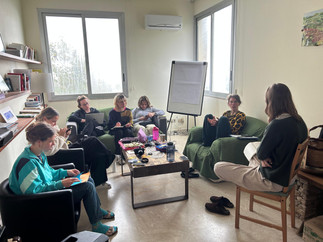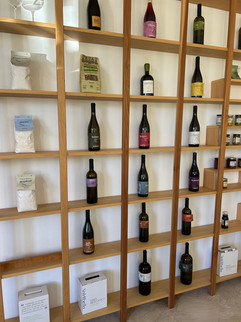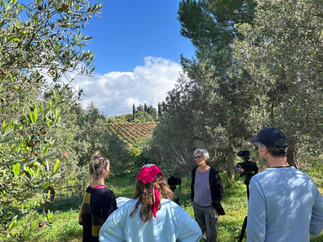Seminar "Sustainability through storytelling in film and media", Sicily, Italy
- Nov 4, 2025
- 4 min read
Updated: Nov 5, 2025

A LITTLE INSIGHT INTO THIS CURRENT SEMINAR / WORKSHOP
"Sustainability through Storytelling" – Reflections from Sicily
It’s a true joy to be here in Sicilia, visiting 3 amazing places cultivating sustainability from Valdibella, over to Bosco Falconeria and to Cooperativa Noe, I was co-guiding this inspiring seminar on Sustainability through Storytelling in Film and Media together with John Dutton.
Surrounded by vineyards, olive trees, and the warm light of Sicily, we’re exploring how creative voices can shape a more sustainable future — one story, one frame, one shared vision at a time.
This seminar might be marking the beginning of a new collaboration between Valdibella and the University of Applied Arts Vienna (die Angewandte). It’s the first of its kind for now — bringing together art students, filmmakers, and thinkers to explore how storytelling can become a bridge between creativity, ecology, and community.

The participating students — Lena Fürjesi, Lena Mayringer, Katharina Idam, Paula Peters, Julia Knappitsch, and Stella Binar — are immersing themselves in the landscape and rhythms of Valdibella. Through film, sound, and observation, they are exploring what sustainability means beyond theory — as a lived practice, as awareness, and as a way of seeing the world anew.
This initiative was made possible through the vision of Massimiliano Solano, who amongst others founded this cooperation and welcomed us to Valdibella with openness, care, and knowledge.
Working here feels deeply grounding.

We’re also grateful for the presence of Chiara del Biasi, his niece, and Vivian Whitney, an expert for ecology education coming from another Cooperation - she accompanied us the whole time and shared her knowledge and experience.
Also we want to give our warmest thanks to Anna the great chef who spoiled us with delicacies, to Walter Pirri, and the son of Massimiliano who showed us the production process, and to Duncan who shared thoughtful insights with us.
In Valdibella, sustainability isn’t just spoken about — it’s embodied in every gesture, every shared meal, every cooperative act. The sense of community and purpose that infuses this place reminds us that creativity and responsibility can grow from the same roots.
As we create and reflect together, one question keeps returning:
How can the stories we tell help us imagine and sustain a world we truly want to live in?
Perhaps storytelling itself is an act of cultivation — tending to ideas, emotions, and relationships that help the future take root.
Here I'll leave you with a few images of the amazing products here at Valdibella:
Valdibella: Doing Things Differently
At Valdibella in western Sicily, sustainability takes a practical form. Under the reflective aluminum bags covering the crops, you’ll find fresh organic produce — and stored CO₂.

This simple method helps control pests naturally, without using chemicals. Insects die off through environmental balance, not poison.

Students on site.
They are learning to document these practices through film, guided by filmmaker John Dutton. The focus is on how stories like this — about real, working models of sustainability — can reach wider audiences and inspire change in media and beyond.
Rooted in Nature: The Living Lessons of Bosco Falconeria
The farm Bosco Falconeria is managed by Natalia Simeti, who runs this organic estate in the region. Her work connects traditional farming knowledge with today’s need for ecological responsibility.
Valdibella shows that it really is possible to do things differently — by working with nature, not against it, and by sharing those stories with others.
Some of the delicacies of chef Anna:
Cooperativa Noè: A Place of Growth Under Threat
In Sicily, the Cooperativa Noè has created something rare — a space where people and plants grow together. The project cultivates endangered and local plant species while providing meaningful work and inclusion for people from the surrounding community — including refugees and individuals on the autism spectrum.
Over the years, more than 2,000 trees have been planted by the cooperative. The area has become both a refuge for biodiversity and a place of belonging for those who often stand at the margins of society.
Now, this living landscape is under threat. The local municipality plans to replace the area with a parking lot. If approved, thousands of trees and countless plants — many of them rare — would be destroyed to make room for cars.
In a time when the effects of climate change are impossible to ignore, such a decision feels disconnected from reality. What message does it send when a community’s inclusive and sustainable project is sacrificed for asphalt?
Cooperativa Noè has shown what care, collaboration, and respect for nature can achieve. Losing this space would mean losing more than trees — it would mean losing a vision of what our shared future could look like.

Learning from Places of Sustainability
As part of the same journey, students from the University of Applied Arts visited these 3 inspiring places — Valdibella, Bosco Falconeria , Cooperativa Noè — to learn from real examples of sustainability in action.
The goal: to understand how stories about climate, agriculture, and community can be told through film.
Under the guidance of filmmaker John Dutton and other experienced mentors, the students observe, film, and reflect on what sustainable living looks like when it’s practiced, not just discussed.
In these environments, sustainability becomes something you can feel — in the soil, in the shared meals, in the collaboration between people from different cultures and backgrounds.
Talking about climate change and ecological responsibility is one thing. Experiencing it directly, and learning to communicate it through art, is another.

That’s the power of this project: using art education to create awareness, and to remind us that meaningful change often begins with seeing — and showing — what already works.
Pictures by © John Dutton, Ruth Mateus-Berr
++ Special Thanks to
More info:






















































































































































Comments